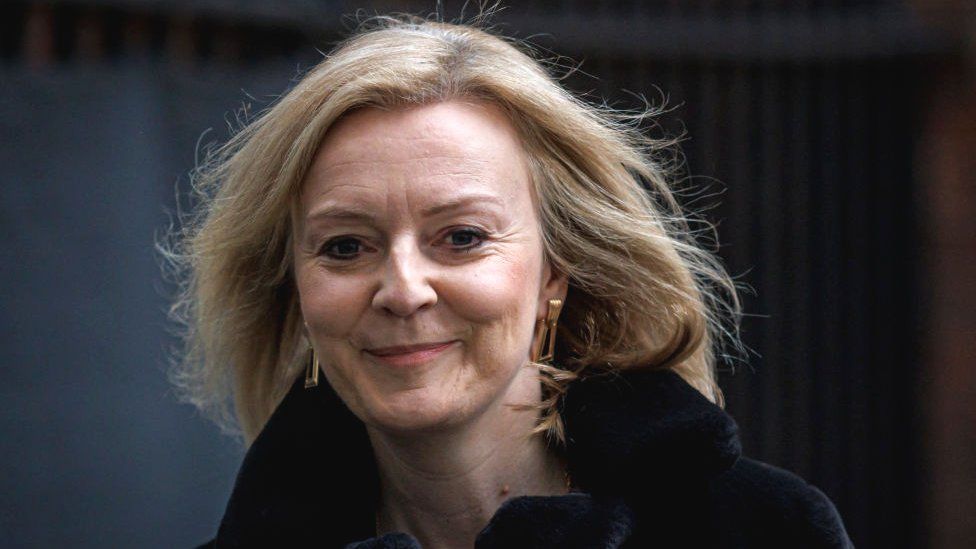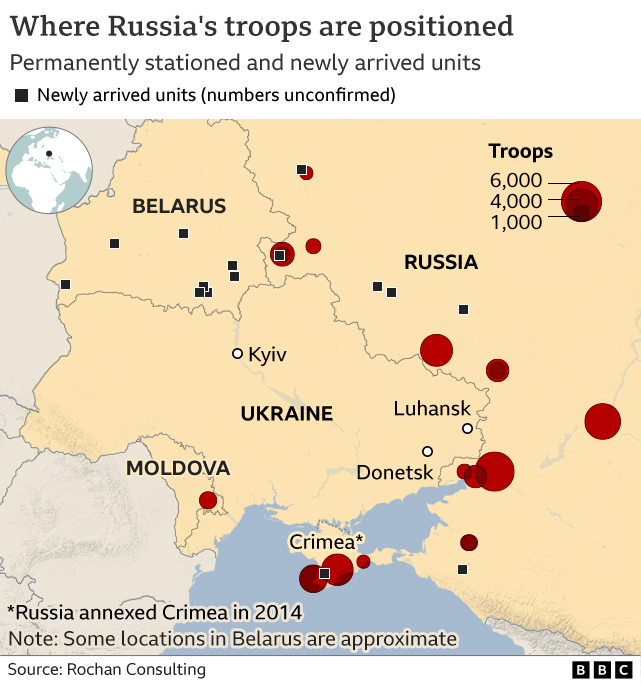
Foreign Secretary Liz Truss has announced new legislation to expand the UK's sanctions regime in the event of Russian aggression against Ukraine.
Currently the government can only impose sanctions on those directly linked to Russian actions in Ukraine.
But the new powers will allow it to target a much broader range of individuals and businesses.
Russia said the threat of more sanctions would backfire, hurting British companies and shareholders.
Kremlin spokesman Dmitry Peskov called it "an undisguised attack on business" and said it would lead to retaliatory measures "based on our interests".
Russia has placed an estimated 100,000 troops, tanks, artillery and missiles near Ukraine's frontiers, but denies it plans to invade the former Soviet republic, which also borders the European Union.
In a statement to the House of Commons, Ms Truss said the legislation - which will be in place by 10 February - would not impose sanctions automatically but provide for additional powers "in the event of any further Russian incursion into Ukraine".
The Foreign Office says the new measures will allow the UK to act "in lockstep with the US and other allies to freeze assets and ban travel".
"We will make sure that those who share responsibility for the Kremlin's aggressive and destabilising action will share in bearing a heavy cost," Ms Truss said.
"Their assets in the UK will be frozen. No UK business or individual would be able to transact with them. And should they seek to enter the UK, they would be turned back."
"Those in and around the Kremlin will have nowhere to hide," she added.


Ms Truss said that the measures amounted to the toughest sanctions regime against Russia yet and were the biggest change in approach by the UK since Brexit.
Reports suggest the US has also drawn up a list of individuals and relatives who could face sanctions.
Ms Truss's statement came as the United Nations Security Council met at the request of the US to discuss Russia's troop build-up.
US President Joe Biden released a statement at the start of the meeting warning Russia of "severe consequences" if it chose to "walk away from diplomacy".
Russia had tried to block the meeting, with its UN Ambassador Vasily Nebenzya accusing Washington of unacceptable interference in its affairs and attempts to whip up hysteria.
Ms Truss has previously spoken of a "real threat" of Russia invading Ukraine, which she says would be "terrible for Europe".
The UK is also sending weapons to Ukraine and offering extra support to nearby Nato allies.

Russia-Ukraine tensions: The basics
This video can not be played
To play this video you need to enable JavaScript in your browser.

Ms Truss was due to visit President Zelensky in Ukraine on Tuesday with the British Prime Minister Boris Johnson.
But on Monday night she announced on Twitter that she had tested positive for Covid-19 and would be working from home while she isolates.
She is also due to visit Moscow within the next two weeks.
In the statement earlier on Monday Ms Truss said the UK had already trained 20,000 troops in Ukraine, supplied anti-tank missiles, and given support to its navy and energy sector.
The UK has more than 900 military personnel based in Estonia and more than 100 in Ukraine as part of a training mission, while a light cavalry squadron numbering about 150 is deployed to Poland.
Russia wants the West to promise Ukraine will never join Nato, in which members promise to come to another's aid in the event of an armed attack, but the US has rejected that demand.
Nato's 30 members include the US and UK, as well as Lithuania, Latvia and Estonia - former Soviet republics which border Russia. Moscow sees Nato troops in eastern Europe as a direct threat to its security.
Mr Putin has long argued the US broke a guarantee it made in 1990 that Nato would not expand further east, though interpretations differ over exactly what was promised.
Russia annexed Ukraine's southern Crimea peninsula in 2014. It is also backing rebels who seized large swathes of the eastern Donbas region soon afterwards, and some 14,000 people have died in fighting there.

- HOW MUCH DO WE REALLY KNOW ABOUT THE PEOPLE WE FOLLOW? The dark side of our obsession with social media
- ONE OF THE BIGGEST MURDER INVESTIGATIONS IN MET POLICE HISTORY: The Nilsen Files on BBC iPlayer

https://news.google.com/__i/rss/rd/articles/CBMiJmh0dHBzOi8vd3d3LmJiYy5jby51ay9uZXdzL3VrLTYwMjAzMjAw0gEA?oc=5
2022-01-31 21:15:50Z
1260207353
Tidak ada komentar:
Posting Komentar